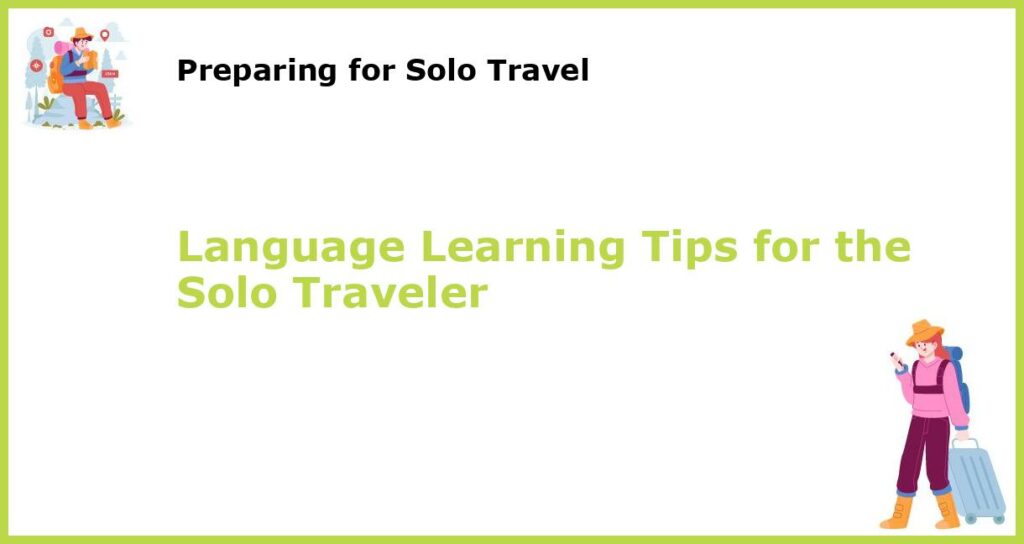Traveling solo can be an incredibly enriching and liberating experience. One of the biggest challenges for solo travelers is adapting to the language and cultural differences of the places they visit. Here are ten language learning tips for solo travelers to help them overcome this challenge.
1. Embrace the Local Language

The first and most important thing you could do as a solo traveler is to embrace the local language. Make an effort to learn the language of the country you’re visiting, even if it’s just some basic phrases. Not only will it enrich your travel experience, but locals will appreciate your effort and may even be more inclined to show you around. Learning the local language will also help you connect better with locals and learn more about their culture.
Start by learning basic hello or goodbye phrases, or simply asking for directions. Just try to learn and practice a few words every day. You will be surprised how far these few words or phrases can take you. People may even be patient with you as you attempt to converse in their language, which can be a great confidence booster.
If you are going to a country with a completely different alphabet, try to learn the basics of the language and the characters. Knowing how to read the signs and menus can greatly improve your experience of the country.
2. Practice Every Day

The second tip is the key to mastering a new language; practice. Even if it’s just for a few minutes a day, try to speak, read, write, or listen to the language you’re learning. Consistency is key! For example, if you are planning to go to France, you can try to listen to French podcasts or audiobooks while you are doing other things around the house.
Try using the new language to order food, haggle at the market, or meet someone new. Every little conversation you have will boost your confidence and increase your vocabulary. It’s also helpful to read books or watch movies in the local language. This not only helps you understand the local culture, but it also helps you to pick up new words and phrases that you might not learn through traditional textbooks.
When you find yourself in conversation, don’t be afraid to ask for help or clarification. Most people are happy to help learners who are making an effort to learn their language.
3. Use Language Learning Apps

The third tip is to use language learning apps. There are many great language learning apps available that you can use on the go. Duolingo, Babbel, and Rosetta Stone are all popular options. The best thing about these apps is that they are free or have a reasonable subscription fee.
This can be a good way to brush up on your language skills and learn new words and phrases between practice sessions. Language learning apps can help you grasp the basics such as nouns, pronouns, adjectives and verbs, as well as grammar and sentence structures.
4. Watch Local TV and Movies

The fourth tip is to watch TV shows and movies in the local language. This is a fun way to improve your language skills. You’ll be exposed to different accents, dialects, and slang that you might not encounter in traditional learning materials. Look for shows and movies that are popular in the country you are visiting.
Streaming platforms like Netflix have a wide selection of foreign shows and movies that can help you get acquainted with local accents and vocabulary. It is also a good way to practice listening and comprehension skills.
5. Take a Language Class

The fifth language learning tip is to take a language class. If you have more time and really want to immerse yourself in the language, enroll in a language school. Many language schools offer short-term courses that are perfect for travelers.
Most classes focus on general conversation skills and can be a great way to meet other travelers and learn from native speakers. Courses can be very helpful in practicing conversational skills in a focused way, and you can also learn more about the culture when you attend classes.
6. Use Flashcards

The sixth tip is to use flashcards. Flashcards are a simple yet effective way to memorize vocabulary. You can make your own or use an app like Anki or Quizlet. One great feature of these apps is that you can share your deck with other learners, making it easier to cover more ground in less time.
You can use flashcards to memorize words or phrases that you learn during your travels. For example, if you try a delicious dish in a local restaurant, you can take a picture of the dish and create a flashcard with the name of the dish and the ingredients. This is a fun way to remember the new words and phrases you learn.
7. Make Conversation with Locals

The seventh tip is to make a conversation with locals. Don’t be afraid to strike up a conversation with locals using the language you’re learning. Even if you make mistakes or stumble over your words, most people appreciate the effort and will be happy to help you improve.
If you can’t find a conversation partner, try to join local conversation groups or language exchange programs where you can meet people who are also interested in practicing and learning new languages.
8. Listen to Local Music

The eighth tip is to listen to local music. Music is a universal language, and listening to local music can help you pick up new words and phrases. Look for local radio stations or ask locals for their favorite artists or songs.
You may not understand all the words at first, but by listening and looking up lyrics, you can expand your vocabulary and improve your listening skills. Music can also help you connect with the local culture and its traditions.
9. Memorize Useful Phrases

The ninth tip is to memorize useful phrases like “hello,” “thank you,” or “where is the bathroom?” before you arrive in a new country. That way you’ll have some basic communication skills right away.
Another great way to learn a few basic phrases is to listen to a mobile app like Google Translate. It can help you with basic phrases in the local language as well as any languages that you may not be familiar with.
10. Practice Makes Perfect
Finally, remember that language learning takes time and effort. Don’t get discouraged if you make mistakes or feel like you’re not progressing as quickly as you’d like. Keep practicing, and soon you’ll be speaking like a local!
Practice and learning are the key to adaptability in a new language. Make it a priority to practice the language for at least 30 minutes every day. Don’t worry about making mistakes, but rather embrace them as a natural part of the learning process.








 You might also be interested in those articles related to solo traveling
You might also be interested in those articles related to solo traveling